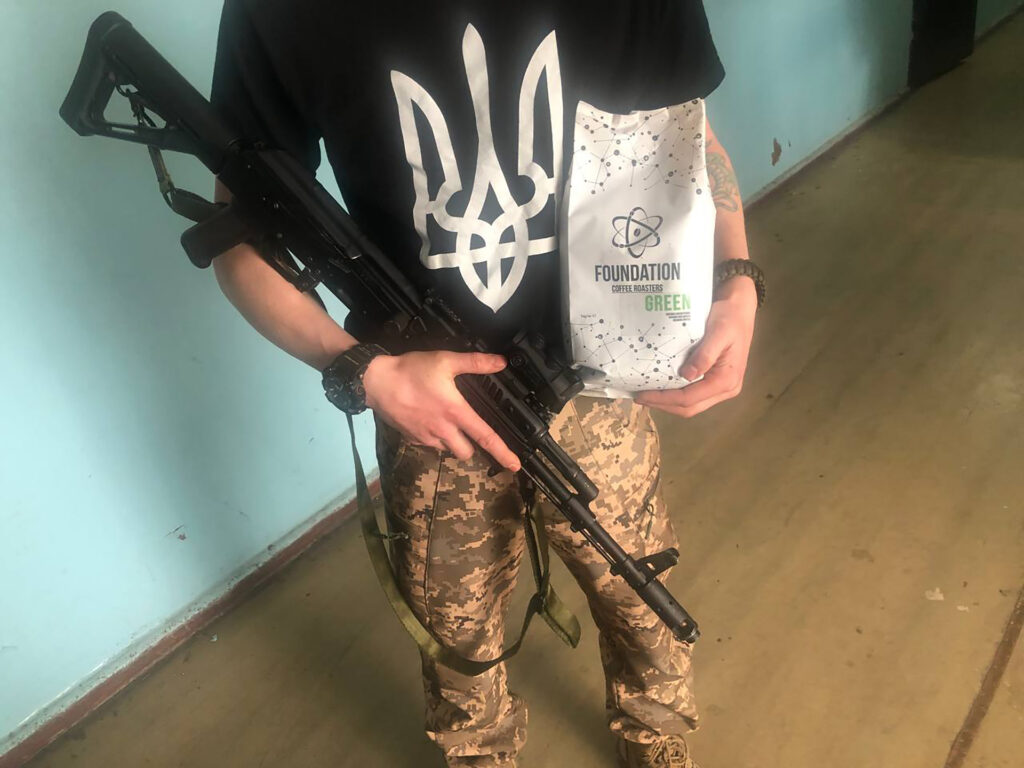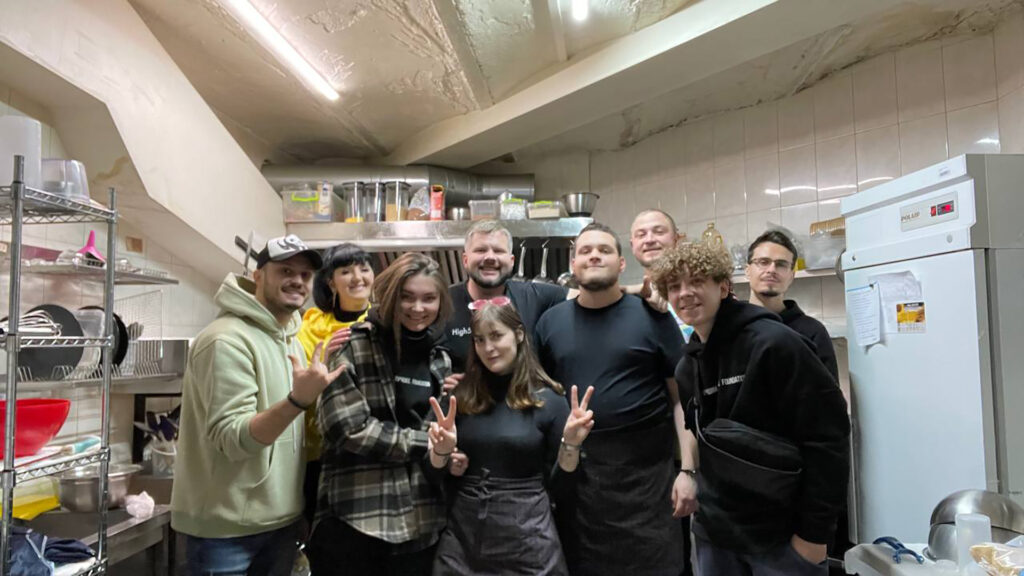At first, it seems like you can only do so much when an aggressor, a nuclear superpower, and one of the strongest armies in the world, launches a brutal and unprovoked war against your country. But while the armed forces of Ukraine have kept up the resistance against all odds, meanwhile, Ukrainian civilians try and support the wartime economy, living life during wartime in a very real sense.
Ukraine Translation Available Here: Еспресо-машина на газу: як одеська кав’ярня Foundation працює під час війни
Under such circumstances, it’s no surprise we could all use a nice cup of coffee.
The toughest it got was in the coldest months of winter when Russia systematically targeted Ukrainian civilian objects and energy infrastructure via missile attacks. Ukrainians ensured the windows were heavily barricaded and the cultural buildings, museums, and places of worship properly protected. The sight of sandbags being used to protect the historic monuments turned out to be one of the most powerful symbols of the war.
Foundation Coffee Roasters created another symbolic image, using the green coffee bags to barricade its flagship store and roastery in Odesa, Ukraine’s stronghold on the Black Sea.
Rocket attacks remain a haunting memory, says Foundation’s Artem Shvedov. “You just freeze, because you don’t know what happens next. I guess that’s what scared me the most then.” He admits his first reaction on February 24 was denial: “I was awakened at 5:00 am with the sound of explosions. But I thought it all was just a dream. My wife and kids were asleep, so I went back to sleep too. Of course, in a matter of hours it all became clear—they really did it, the full-scale war started.”

Odesa—a major, million-strong seaside Ukrainian city and one of the biggest sources of Ukrainian-Jewish migration to the US in the 20th century—was one of the biggest targets for Russia in the first stages of the invasion. The plan for the Russians was to capture the Ukrainian capital Kyiv and decapitate the Ukrainian government while making territorial gains in the south and the east of the country. After the occupation forces took the southern regional capital of Kherson and went for the neighboring Mykolayiv, the next step was to land D-Day style on the beaches around Odesa and cut off Ukraine’s access to the Black Sea. Odesa was ultimately saved from a potential siege by a number of factors, including the heroic defense of Mykolayiv by Ukraine’s armed forces, as well as the storms in the Black Sea in late February and March were also of big help.
“Yeah, we do feel quite grateful,” Roman Shakhov of the Foundation team tells me. “But at the time there was this strong effort to be helpful, to support our country and our team. It’s better to work your ass off rather than just sit still and succumb to fear.” His colleague, Artem Shvedov, adds that the first thing the company did on February 24 was to gather the staff and pay the month’s wage early. Foundation Coffee got back to work on February 26, barricading the windows with green coffee bags, starting the volunteering effort, and providing food and coffee for the Ukrainian soldiers. For a number of weeks, a couple of team members spent their nights in the safety of the coffee shop’s basement.

“The idea was to be helpful, whatever way we could be,” Shakhov says. He explains this idea of “invincibility points”—the places people can get a respite, a power charger, and a cup of hot coffee in trying times—the establishments Ukrainian government and businesses opened up over the winter to provide shelter for the people.
The Foundation team still cooks for charity to this day, churning up to 100-200 meals daily. “We’ve provided more than 30,000 meals at this point,” Shvedov adds. Since the full-scale invasion started, the team has worked with Odesa humanitarian center and Global Medic charity organization.
“The truth is we’ve only ever worked in wartime,” Foundation founder and CEO Tymur Kozonov tells Sprudge; the company was founded in 2015, soon after Russia launched the war against Ukraine in 2014 with the illegal annexation of Crimea and proxy forces operations in the Donbas region. Still, the challenge of the big war is an unprecedented one for Foundation, he admits.
Kozonov launched the Foundation family of brands with his then-wife eight years ago, but he has a wealth of experience in the coffee industry after a decade in a commercial coffee company. He was one of the pioneers of the new wave of Ukrainian coffee culture, establishing freshly roasted, specialty-grade coffee in the Odesa market. Foundation Coffee Place in central Odesa combines a modern coffee shop location with a roastery, and the team also operates a network of smaller coffee shops. At this point, Foundation provides jobs for 70 people in the roasting department, coffee shop personnel, and sales, which makes it one of the biggest Ukrainian specialty coffee companies.
“2021 was our most successful year to date,” Shevdov says. “We’ve never had such a strong season, with both the coffee shop and wholesale thriving.” After a year of Covid lockdowns, 2021 turned out a great time to do business with Ukraine, as the country also had an influx of tourists: at that point, most of Europe was still closed to visitors, so Ukraine’s managed to lure a lot of visitors, especially from Saudi Arabia and the Gulf countries. “We had so many plans for 2022. It all came crashing down on February 24,” Sehvdov says.
After the initial war developments in the spring and summer of 2022, Odesa started to adapt to a new wartime reality. The city has definitely changed, having welcomed a lot of refugees from the nearby regions, including the frontline cities of Mykolayiv and Kherson. The biggest problems came after the winter started, though. The Russian occupation forces started to target Ukrainian energy infrastructure to make the country’s cities unlivable. After Russian missiles hit the Odesa power stations in the winter came a long period of electricity shortages. “There was a period when we did not have power for like four or five days,” Shevdov says. “I remember on New Year’s Eve, we had these brutal power outages because everyone was at home trying to cook a festive meal. It’s a miracle the system withstood all the pressure.”
The challenge of operating a number of coffee shops and a roastery without any power stretched the team thin, but a gas-powered roaster proved to be a godsend. Eventually, the staff was creative and tech-savvy enough to update an espresso machine with a gas-powered system to continue serving the guests. How does one adapt a Rancilio espresso machine to run on gas? “It’s our technical team’s know how,” Artem Shvedov lets out a laugh, “They basically can take a whole Rancilio apart and put it all back together.” The team says the idea was to connect the machine to a gas-powered source, it took the technicians a week, but the result was worth it. Foundation Coffee Place was churning out espressos and cappuccinos from the gas-powered experimental Rancilio for two months when Odesa was power-depleted.
The team went on to make all the kitchen equipment gas-powered to continue serving dishes. A gas stove was also bought and set up, with all the hand-brewed coffee being prepared using gas, not electricity. “At least we didn’t have to change our coffee grinders for the gas-powered ones,” Shakhov laughs. “Or use the manual ones!” Shvedov adds. A neighborhood bakery offered to store the desserts for Foundation Coffee Place. “That’s the power of community right then and there!” Shvedov says.
Foundation is better for all this extreme experience, something everyone on the Foundation team expressed to me throughout this story. The idea to start working outside Ukraine was in the making even before the full-scale Russian invasion started. Foundation has opened a shop in Poland, home to many Ukrainian refugees, and it’s operated by the team’s head of roasting.
“We’re still a Ukrainian business at heart,” says Kozonov, “and we still consider Ukraine to be our main market. But we have to go west, both because we want to support a number of our team members who had to relocate to Europe and for all the potential that foreign markets bring.”
The Poland hub helps with the logistics and wholesale deliveries all across Europe, and it’s also necessary for the Foundation to establish itself in the EU countries. The next step for the team is the US, Artem Shvedov says. The company’s looking into the American coffee scene and working to finalize an agreement with a world-famous Ukrainian restaurant in New York to bring Ukrainian roasted specialty coffee to America. This story is not over. It is only beginning.
Yaroslav Druziuk is the Editor In Chief of Blackfield Coffee, a Ukrainian coffee culture website. Read more Yaroslav Druziuk for Sprudge.